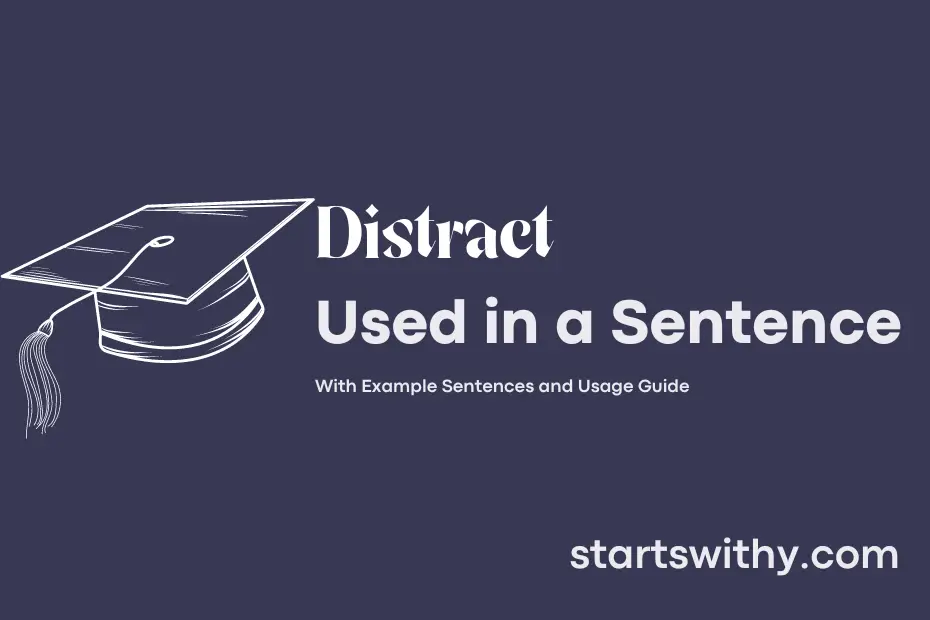Do you ever find yourself struggling to maintain focus due to external factors pulling your attention away? This is what we often refer to as being distracted. Distracted means being unable to concentrate or pay attention to something because something else is diverting your focus.
Many things can distract us in our daily lives, such as noise, technology, or even our own thoughts. Learning how to minimize distractions can help improve productivity and overall well-being.
7 Examples Of Distract Used In a Sentence For Kids
- Can distract you from your book?
- Let’s not distract others during class.
- Please don’t distract the teacher.
- Distract the puppy with a toy.
- Loud noises can distract us.
- Let’s distract ourselves with a fun game.
- It’s important not to distract the bus driver.
14 Sentences with Distract Examples
- Distract yourself with some music while working on your assignments.
- It’s important not to let your friends distract you during exam preparation.
- Don’t let social media distract you from focusing on your studies.
- Distract yourself with a quick snack break to rejuvenate your mind.
- Try not to let the noise in the library distract you from studying.
- It’s easy to distract yourself by multitasking, but it can decrease your productivity.
- When attending lectures, avoid letting your phone distract you.
- Take short breaks to distract yourself from the monotony of studying.
- Surround yourself with a conducive environment that won’t distract you from your studies.
- Don’t let negative thoughts distract you from reaching your academic goals.
- Distract yourself with a quick workout to break up long study sessions.
- Try not to let personal issues distract you from your coursework.
- Set specific times for socializing to avoid it distracting you when you need to study.
- It’s essential to prioritize your tasks to avoid feeling distracted by everything you need to do.
How To Use Distract in Sentences?
To use “Distract” in a sentence, start by identifying a situation where someone’s attention needs to be diverted or disrupted. For example, “To distract the toddler from crying, the mother showed him a colorful toy.”
Next, place the word “Distract” within the sentence in a way that makes sense and creates a clear understanding of the action being taken. Make sure that the word fits naturally within the sentence structure. For instance, “The loud music in the background began to distract the students during the exam.”
Remember to pay attention to the context in which you are using the word “Distract.” Consider the impact of the distraction on the person or situation, and make sure to use the word appropriately. For example, “Although the bright lights were meant to distract the audience, the performers still managed to captivate their attention.”
In conclusion, when using the word “Distract” in a sentence, it is important to choose the right moment to divert attention and ensure that the word is integrated smoothly into the sentence. Practice incorporating “Distract” in various scenarios to become more comfortable with its usage and to effectively convey the intended meaning.
Conclusion
In conclusion, distractions can have a significant impact on our ability to focus and complete tasks efficiently. From noisy environments to constantly checking our phones, distractions can derail our productivity and hinder our progress. Being mindful of what distracts us and taking steps to minimize these interruptions can help us stay on track and accomplish our goals more effectively.
By recognizing when we are being distracted and implementing strategies to limit these interruptions, such as creating a designated work space or setting specific times for checking messages, we can improve our concentration and overall productivity. Ultimately, by reducing distractions in our daily lives, we can experience greater levels of focus, accomplish more in less time, and achieve a greater sense of satisfaction in our work and personal endeavors.




